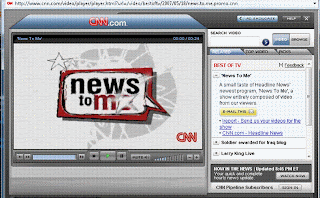Experiencing the bubble
This is my experience trying to buy a webTV service.
21-Oct-07: I contacted the commercial department asking for more details of the service provided.
25-Oct-07: I contact the CEO (a quite known enterpreneur and Web2.0 guru). He immediately answered begging excuses and sending a copy to the commercial department urging to contact me.
07-Nov-07: As I got no answered I send an email to the contact the CEO provided me. I get an email from another commercial staff. two days later I get a phone call and we discuss the details and terms of service. He tells me he will send me all the details by mail.
09-Nov-07: I send an email asking for those details (I never trust a phone conversation, I need downwritten statements). Got the email, but lacking of details. I analyze the data provided and send him an email back asking for the rest of information as well as for some other details.
14-Nov-07: Got an aswer saying "I am not able to anwser, I need to check it with the technical service. I will send it to you asap".
21-Dec-07: No answer or any followup by this company.
Bad service or no interest on providing a service. Is this company just waiting for the right moment to be sold for a dizzy amount of honey money?











